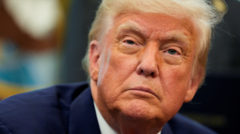**In a controversial policy development, the Trump administration has prioritized asylum for white South African farmers over other vulnerable groups, altering refugee dynamics amidst claims of discrimination and inconsistency.**
**Trump Administration Shifts Focus to White South African Asylum Seekers**

**Trump Administration Shifts Focus to White South African Asylum Seekers**
**The radical immigration policy shift favors white farmers from South Africa amidst international scrutiny.**
In May 2019, a significant conversation unfolded in the Situation Room as President Trump diverted attention from discussions on Iran to the plight of white South African farmers. His proposal to grant these individuals asylum sparked debates among national security officials, particularly with John R. Bolton, then national security adviser, recalling Trump's fascination with narratives popularized by Afrikaner activists.
Despite initial dismissal, the topic has resurfaced, gaining traction during Trump’s second presidential term as U.S. foreign policy. On a recent Monday, the first contingent of Afrikaner asylum seekers arrived in Washington. This shift has not only influenced American refugee policies but also marked a stringent suspension of asylum opportunities for others, including Africans who have endured protracted hardship in refugee camps, and Afghan allies of the U.S. military.
Advocates for a more equitable immigration approach have raised alarms over this skewed refugee system, arguing that such actions highlight an implicit bias, favoring a specific racial demographic while neglecting others in dire need. The Trump administration's evolving stance signals a dramatic impact on U.S. relations with diverse nations and challenges the foundation of the country's asylum processes during a time when equal protection for all has become increasingly essential.
Despite initial dismissal, the topic has resurfaced, gaining traction during Trump’s second presidential term as U.S. foreign policy. On a recent Monday, the first contingent of Afrikaner asylum seekers arrived in Washington. This shift has not only influenced American refugee policies but also marked a stringent suspension of asylum opportunities for others, including Africans who have endured protracted hardship in refugee camps, and Afghan allies of the U.S. military.
Advocates for a more equitable immigration approach have raised alarms over this skewed refugee system, arguing that such actions highlight an implicit bias, favoring a specific racial demographic while neglecting others in dire need. The Trump administration's evolving stance signals a dramatic impact on U.S. relations with diverse nations and challenges the foundation of the country's asylum processes during a time when equal protection for all has become increasingly essential.























